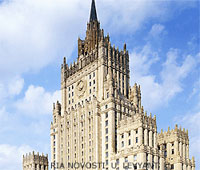NPOs law could be further corrected – diplomat

(Interfax – February 19, 2014) No more than 1,000 checks have been conducted with respect to nonprofit organizations (NPOs) operating in Russia, which were fined a meager amount, whereas the total number of NPOs in our country is 200,000, the Russian Foreign Ministry’s Human Rights Commissioner Konstantin Dolgov said.
The accusations against Russia over NPOs checks are baseless, he said.
“There were not tens or hundreds of thousands of such checks, but a total of about 1,000 NPOs were checked and fined meager sums. The total number of NPOs in Russia is 200,000,” Dolgov said at a Federation Council roundtable titled, “Legal protection of the state’s constitutional structure and security: modern approaches and international-law experience.”
Such a large number of NGOs in Russia “is shocking even for our U.S. and European counterparts,” he said.
When working with international institutions and international partners on the subject of its legislation Russia must use a thesis which consists in that any particular law can only be amended after implementation of that law (of the law enforcement practice), Dolgov said.
“This is not about shortcomings of any particular law. Problems can arise, and that is normal from the viewpoint of international practice, and we are telling our international colleagues: let us wait and see how these laws are implemented. And if need be, these laws will be corrected, but not by the Council of Europe, nor the United States or the OSCE (Organization for Security and Co-operation in Europe) but solely by our Russian legislators on the basis of the first section of the application of these laws,” Dolgov said.
Such an approach by Russia is increasingly met with greater understanding internationally, he said. “There is not a single law which is passed once and for all,” the diplomat said.
The Russian Foreign Ministry monitors and analyses the enforcement practice of the laws of other countries which are regarded as “flagships of democracy,” Dolgov said.
“And there is a huge field for double standards here, which are being used by our foreign partners, there is no single algorithm on the issues of information security and the maintaining of a state secret. And very often considerations of national security in Western countries prevail over those of human rights,” Dolgov said.
A case in point is the U.S. soldier Bradley Manning who was sentenced by a U.S. court to 35 years in prison, although his lawyers insisted that the Manning case does not involve espionage, the Russian diplomat said. The United States has absolutely no interest in human rights activists’ view on these issues, he added.
A day earlier I spoke to Amnesty International representatives about the current situation around Russian pilot Yaroshenko jailed in the U.S., he said. “The necessary medical aid is not provided to him, and he is dying, so let us see what Amnesty International says to that,” Dolgov said.
